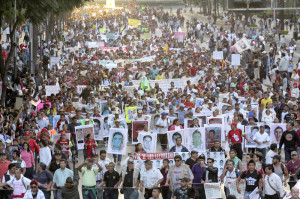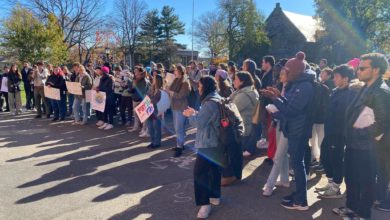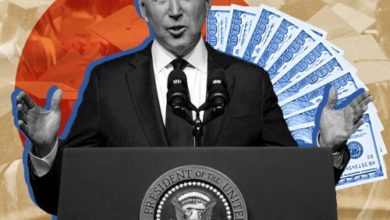 This week, tens of thousands of people have protested and marched across Mexico in an act of solidarity with the 43 abducted students from Iguala, the third largest city in the state of Guerrero.
This week, tens of thousands of people have protested and marched across Mexico in an act of solidarity with the 43 abducted students from Iguala, the third largest city in the state of Guerrero.
In late September, 43 students from the Ayotzinapa Normal School, a teacher’s college in Iguala, seemingly disappeared, which has sparked outrage across the country. As Maria de los Angeles Pineda, wife of Iguala mayor, Jose Luis Abarca, delivered a speech, the students took buses from the local bus station in order to travel to Mexico City and commemorate the October 1968 massacre in Tlatelolco. Bus fares have been rising and students received permission from the bus drivers to take the buses.
Suddenly, the student activists were attacked with machine guns fired by the police. Six students were killed and one was brutalized with a boxcutter. Forty-three students were then taken away in police cars and have not been heard from since.
The community members have risen in anger through militant demonstrations, which have frequently included the burning of government buildings. Officials continue to search for the bodies of the student activists and find makeshift mass graves with the remains of other people, which adds to the people’s indignation.
The consistent mass protests have forced the resignation of the governor of Guerrero, the capture of Iguala’s former mayor Abarca and his wife, and the demand for President Peña Nieto’s resignation.
Patronizing stories in the corporate media
The U.S. media is reporting this “disappearance” as yet another result of the lawlessness and corruption of Mexican politics, specifically focusing on narco-corruption. The police that assaulted the students were working with the Guerreros Unidos drug cartel. It is suspected that Abarca was a main operative in the cartel, receiving payments to bribe and pay the corrupt police force. What the U.S. media ignores is that the people’s escalating struggle demands answers as well as the resignation of politicians that do not have the people’s interests at heart.
However, while we should critique the causes of narco-corruption and the role that U.S. imperialism has played in both spreading corruption and impoverishing Mexico, we should also battle the idea that what is happening in Mexico is far and distant from what happens in the streets of Chicago, New York, Los Angeles, Albuquerque and so many other cities and towns.
Last week, The New Yorker told the story of Manuel Martinez, the father of Mario, one of the abducted students. Mario, like many of the students in the teacher-training school, is from an impoverished village and part of the indigenous Huave people. Martinez stated that, “The authorities should pay for what they’ve done because they’ve done the very worse that you can do, to the most humble of people.”
After pulling the reader’s heartstrings, Francisco Goldman, the author of the article, goes on to question the tactics of the movement in organizing mass protests and strikes. He ends with the following: “It is also possible that the path to solving Mexico’s problems need not be so drastic [referring to protests and strikes]. Flawed and abused as it has been, the country is still a democracy.”
Martinez is right, the cops must pay because they have taken away the life of a student activist who wanted to improve his community and the prospects of his people while representing one of the most oppressed communities in Mexico.
His statement, however, is not unique to Mexico. The police in the United States are allowed to kill with impunity in order to hold down the most oppressed sectors of society, the very sectors that can threaten the stability of the status quo if mobilized. It is in the interest of the ruling class, whether in Mexico or the United States, to protect the capitalist system that allows them to exploit poor and working people.
We are taught that we can change our prospects through the ballot box because we live in a democracy. Our experiences have taught us that this is not true. Elections are an important arena of struggle for revolutionaries, but as we know them under this system we choose between puppets that represent no fundamental change – only maintain the illusion of democracy. This is a method used to impede the development of our consciousness. How is it beneficial for a homeless man to have the right to vote but not the right to a home?
Goldman is wrong. More drastic methods are entirely justified be used because literally the lives of our oppressed brothers and sisters across the world depend on it.






